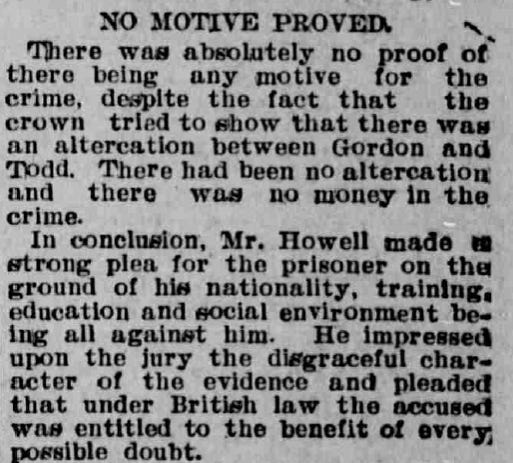In Episode 1, John Gordon was found dead on a sidewalk with a bullet hole in his forehead. In Episode 2, Eli (“Stodge”) Stodgell, a Métis police constable, confronted Donald Todd, the main suspect. In Episode 3, Stodge hatched a plan to use his brothers, Harry and Bert, to get Todd to confess to Gordon’s murder. In Episode 4, the brothers, with the help of their sister, Mary, put the plan into action. I
Here are the last two paragraphs from Episode 5, “The Confession”:
“I did not own an overcoat. I read an advertisement on mesmerism but I never studied it. I never drew a revolver on George Bruce. I did not rob Amy Bernard of $35. I did not Rob Thomas at St. Charles. I never had a fight with John Gordon.”
The court then adjourned until this morning.
There’s an audio version of this episode for paid subscribers behind the paywall at the bottom of this post.
A large crowd assembled in the courtroom to hear counsel for the crown and the defence deliver their addresses and His Lordship to charge the jury.
Mr. Howell spoke first. The main thrust of his argument was a forcible critique of the methods used by the police.
“The means used to entrap this man were despicable. The police played upon his weaknesses. They tempted him with women, debauched him with drink for days on end, hired paid traitors to worm themselves into his confidence, and then induced him with monetary rewards to confess to a crime he never committed. This is trickery of the lowest order, an awful deception perpetrated on a vulnerable man whose mind was lost to delirium tremens.
A confession from a man under these circumstances is worthless. To be of any value a confession must be obtained without undue influence. The rule is well known: no confession that is made in consequence of any threat or inducement of a temporal nature — not a spiritual one — made by a person in authority is admissible. It must be free and voluntary, from a man when in his sober senses. If it flows from hope or fear, excited by a person in authority, it is inadmissible.
Those confessions alleged to have come from Todd did so under the most debasing and distressing circumstances. It was not the truth these spies were after, but to betray Donald Todd and earn their thirty pieces of gold. The only difference between these men and Judas Iscariot was Judas was at least man enough to hang himself, and these miscreants have so far not found it in them to do likewise. They made him believe that unless he was a murderer, he could not join their gang of desperados. Under these conditions, Todd would sign anything. A rattlesnake is more of a gentleman than a man who worms his way into a man’s confidence and then cuts his throat.”
Keep reading with a 7-day free trial
Subscribe to Hexagon to keep reading this post and get 7 days of free access to the full post archives.




